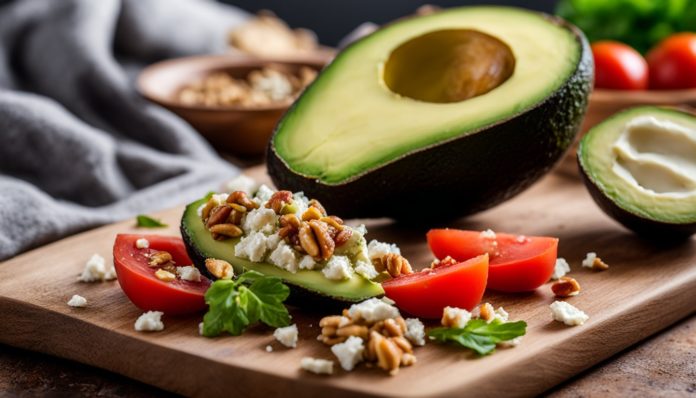Vitamin B5, or Pantothenic Acid, is vital for optimal health. It helps with many body functions, like turning food into energy and maintaining skin health. Knowing the benefits and sources of Vitamin B5 can boost your health and nutrition.
Key Takeaways
- Vitamin B5 is also known as Pantothenic Acid.
- It is crucial for maintaining optimal health.
- Supports various body functions, including metabolism and skin health.
- Understanding Vitamin B5’s benefits can enhance nutritional intake.
- Key for overall wellness and reducing stress.
Introduction to Vitamin B5
Vitamin B5, also called pantothenic acid, isessential in the B-vitamin group. It helps maintain your health and well-being. Being widely available in many foods, it aids in energy creation and making important fats.

The Vitamin B5 importance is easy to see since it’s in many common foods. Eating enough of it helps your body turn carbs, proteins, and fats into energy. This is vital for your daily health and wellness routines.
Nutrition experts say getting enough Vitamin B5 improves your health greatly. For those wanting to learn more about its benefits, reading up on the subject is suggested. You can explore further resources too.
To sum up, knowing the Vitamin B5 importance gives you insight. It shows its crucial role in supporting a balanced, healthy lifestyle. This covers different aspects of health and wellness.
What is Pantothenic Acid?
Pantothenic Acid, or Vitamin B5, is a key nutrient found in nearly every food group. It is vital for many body functions, making it essential for our health.

The Chemical Structure of Vitamin B5
The Vitamin B5 chemical structure includes a pantoic acid bound to beta-alanine. This structure lets Pantothenic Acid help in making and breaking down proteins, carbs, and fats. Being water-soluble, our body easily absorbs and uses it.
The Role of Pantothenic Acid in the Body
The biological role of Pantothenic Acid is vast. It is crucial for making Coenzyme A, important for breaking down fatty acids. This is key in the Krebs cycle, vital for making energy. Pantothenic Acid also helps make red blood cells and steroid hormones, showing its key role in our body.
Health Benefits of Vitamin B5
Vitamin B5, known as pantothenic acid, is key to a healthy diet. It supports metabolism, boosts skin health, and lowers stress and anxiety.
Metabolism Support
Vitamin B5 helps our bodies make energy from food. It’s involved in making coenzyme A, important for metabolism. It helps use carbs, fats, and proteins, keeping our metabolic health strong.
Enhancing Skin Health
Vitamin B5 is great for skin health. It helps make coenzymes necessary for skin renewal and repair. Taking Vitamin B5 can help your skin stay hydrated, look younger, and feel healthier.
It’s shown to speed up wound healing. It can also lessen acne and dermatitis issues.
Reducing Stress and Anxiety
Vitamin B5 plays a role in reducing stress and anxiety. It supports adrenal glands, managing our stress responses. This helps ease stress and anxiety symptoms, making us feel better overall.
Adding this vitamin to your diet promotes emotional balance. It helps fight off mental tiredness.
Best Dietary Sources of Vitamin B5
Vitamin B5, or pantothenic acid, is key for many body functions. Adding the best dietary sources of Vitamin B5 helps meet your nutritional needs. You can find this vitamin in both animal and plant foods, fitting all diets.
Animal-Based Sources
Animal foods are a top source of Vitamin B5. Great choices include chicken, turkey, beef liver, and salmon. Products like cheese and milk also give lots of Vitamin B5. Eating these can keep this important nutrient at good levels.
Plant-Based Sources
If you like plant foods, there are plenty of Vitamin B5 sources. Try whole grains such as brown rice and oats. You can also eat legumes like lentils and chickpeas. Veggies, especially avocados and sweet potatoes, are great too. These foods offer Vitamin B5, other nutrients, and fiber for your health.
Here’s a table comparing animal and plant sources of Vitamin B5. It’ll help you add these foods to your meals:
| Animal-Based Sources | Plant-Based Sources |
|---|---|
| Chicken | Brown Rice |
| Turkey | Oats |
| Beef Liver | Lentils |
| Salmon | Chickpeas |
| Cheese | Avocados |
| Milk | Sweet Potatoes |
To boost your health, learn about the best sources of Vitamin B5. For more dietary tips, check out our health care navigator.
Recommended Daily Intake of Vitamin B5
It’s crucial to meet your Vitamin B5 needs to stay healthy. Authorities give daily intake recommendations for Vitamin B5 to guide us. They tell us how much we need.
For adults 19 and older, about 5 mg of Vitamin B5 a day is the norm. Pregnant women should get 6 mg daily, and those breastfeeding need 7 mg.
Here’s a detailed table showing daily Vitamin B5 needs for different groups:
| Population | Recommended Daily Intake (mg) |
|---|---|
| Infants (0-6 months) | 1.7 |
| Infants (7-12 months) | 1.8 |
| Children (1-3 years) | 2 |
| Children (4-8 years) | 3 |
| Children (9-13 years) | 4 |
| Adolescents (14-18 years) | 5 |
| Adults (19+ years) | 5 |
| Pregnant Women | 6 |
| Lactating Women | 7 |
You can get more info on these guidelines by visiting daily intake recommendations from health experts.
Vitamin B5 Supplements
It’s tough to get enough vitamins from food in our busy lives. That’s why *Vitamin B5 supplements* are so helpful. They make sure we get enough pantothenic acid when our meals don’t. Let’s look at what Vitamin B5 supplements are out there and how to pick the best one.
Types of Supplements
Different supplement types of Vitamin B5 meet various needs and tastes:
- Capsules – The most typical form, easy to take.
- Tablets – Like capsules but might be bigger.
- Powder – Perfect for mixing with drinks or food.
- Liquid – Absorbs fast, great for those who struggle with pills.
Choosing the right Vitamin B5 supplement can be tough with so many options. Each type has its perks. Your lifestyle and health needs should guide your choice.
Choosing the Right Supplement for You
Choosing the right supplement requires looking at your diet and needs. Check if you need Vitamin B5 supplements. A doctor can offer advice, making sure it fits with your other meds.
Here’s a breakdown to help compare different Vitamin B5 supplements:
| Supplement Type | Advantages | Best For |
|---|---|---|
| Capsules | Easy to swallow, convenient | General use |
| Tablets | Widely available, often cheaper | General use, cost-aware |
| Powder | Customizable dosage | Fitness fans, precise dosing |
| Liquid | Quick absorption | Kids, those who can’t swallow pills |
Your choice in supplements should match your health goals and lifestyle. With correct information and advice, Vitamin B5 supplements can boost your health significantly.
Vitamin B5 Deficiency Symptoms
Vitamin B5 is key for our health. Not having enough can lead to serious health issues. It’s key to spot signs early to avoid health problems.
Recognizing Deficiency Signs
Knowing early signs of a lack can stop worse health problems. Common deficiency symptoms are:
- Fatigue
- Irritability
- Nervous system disturbances
- Muscle cramps
- Digestive issues such as abdominal pain
These signs show up slowly. It’s important to watch for small health changes. If symptoms stay, get medical help.
Long-Term Health Risks
Not having enough Vitamin B5 long-term is risky. Chronic lack of it can cause big health issues, like:
- Increased risk of cardiovascular diseases
- Adrenal insufficiency
- Compromised immune function
- Metabolic disorders
Finding and fixing a deficiency early is key for staying healthy. We need to eat right or take supplements to avoid Vitamin B5 lack risks.
Integrating Vitamin B5 into Your Diet
Adding Vitamin B5 to your daily meals is crucial for better health. This vital nutrient aids in creating energy, making hormones, and keeping your skin, hair, and nails healthy. Learning about its benefits and food sources ensures your diet is both healthful and tasty.
Healthy Recipes Rich in Vitamin B5
Creating meals full of Vitamin B5 is a fun way to boost your diet. No matter the meal time, many choices are available:
- Avocado and Egg Breakfast Sandwich: This combines creamy avocado and protein-rich eggs, both packed with Vitamin B5.
- Salmon Quinoa Bowl: Brings together salmon and quinoa, with veggies and a tangy lemon-tahini dressing.
- Grilled Chicken and Veggie Stir-Fry: A colorful mix of chicken, bell peppers, and broccoli over brown rice.
Tips for Meal Planning
Meal planning with Vitamin B5 helps ensure you get this nutrient regularly, supporting your health. Here are tips for including Vitamin B5 in your meals:
- Balance is Key: Include a mix of Vitamin B5 foods. Options range from chicken and fish to avocados and sunflower seeds.
- Batch Cooking: Cook big amounts of Vitamin B5 meals and keep some for later. This saves time and keeps nutritious meals on hand.
- Utilize Seasonal Produce: Use fresh, seasonal fruits and veggies that are rich in Vitamin B5. This adds variety and keeps your diet interesting.
By heeding these suggestions, you’ll create a diet rich in Vitamin B5. This helps you stay healthy and full of energy. A steady supply of Vitamin B5 in your diet promotes good health and well-being.
The Role of Vitamin B5 in Metabolism Support
Vitamin B5, also known as pantothenic acid, is key for metabolic processes and energy production in our bodies. It helps to make coenzyme A. This is vital for turning carbs, fats, and proteins into energy.
Vitamin B5 is necessary for energy metabolism, which is a group of processes. Without enough of it, our ability to break down food and make energy drops. This can lead to tiredness and metabolic issues.
Vitamin B5 is also crucial for breaking down fats into fatty acids and triglycerides. These are then used by cells for energy production. This shows why it’s important to have enough Vitamin B5 for your metabolism to work well.
Eating foods high in Vitamin B5 is a good way to keep your metabolism healthy. Foods like meat, fish, whole grains, and some vegetables are good sources. These foods help keep your metabolic processes running smoothly.
| Food Source | Vitamin B5 Content (mg per 100g) |
|---|---|
| Chicken liver | 6.7 |
| Avocado | 1.5 |
| Sunflower seeds | 7.0 |
How Vitamin B5 Enhances Skin Health
Vitamin B5, also known as Pantothenic Acid, is key for good skin health. It’s vital both as a topical product and through eating foods that contain it. This part explains how using topical Vitamin B5 and eating foods rich in it helps skin look its best.
Topical Applications and Creams
Using Vitamin B5 creams and ointments on the skin is popular for boosting health. It deeply hydrates by reaching the lower skin layers. This keeps skin smooth and prevents dryness.
Doctors recommend it for skin issues like eczema and acne because it reduces swelling. It’s in many skincare products, helping to soothe the skin and improve its appearance. Check out these Pantothenic Acid benefits for skin for more on its soothing effects. With regular use, it strengthens the skin’s barriers and makes its texture better.
Internal Benefits for Skin
Eating foods high in Vitamin B5 also helps skin from the inside. It aids in cell renewal and lowers inflammation. Getting enough Vitamin B5 in your diet helps heal the skin, keeping it clear and healthy. Foods like avocados, eggs, and fish are great for this.
For those who want a boost, Vitamin B5 supplements can offer the same skin benefits. Whether through food or pills, the goal is healthier, youthful-looking skin.
Here is a look at the different sources and benefits of Vitamin B5:
| Form | Primary Benefits | Examples |
|---|---|---|
| Topical | Deep hydration, reduced inflammation | Creams, ointments |
| Internal | Cellular regeneration, skin healing | Natural foods, supplements |
In short, Vitamin B5 is fantastic for skin, whether applied on it or eaten. Using it both ways is the best strategy for great skin health. It shows the complete benefits of Pantothenic Acid for your skin, leading to a comprehensive skincare approach.
Conclusion
We’ve taken a close look at Vitamin B5, or pantothenic acid, and its critical role in our health. This guide showed how it helps our metabolism, skin health, and relieves stress. It’s clear that getting enough Vitamin B5 is key for our well-being.
Exploring Vitamin B5’s chemical makeup and significance was fascinating. It plays a major part in turning food into energy and keeping hormones balanced. Its benefits are vast, including boosting metabolism and skin condition. To enjoy these benefits, it’s important to eat foods rich in Vitamin B5.
We talked about how much Vitamin B5 you should get each day and how supplements might help. Knowing the signs of not having enough is vital to avoid health issues. This info helps you make sure you’re getting what your body needs.
Having enough Vitamin B5 in your diet is more than just following recommendations. It’s essential for your metabolism, skin, and easing stress. With this summary, you’re better equipped to make choices that support your health through Vitamin B5 intake.
FAQ
What are the primary benefits of Vitamin B5?
Vitamin B5, known as Pantothenic Acid, boosts metabolism and skin health. It might lower stress and anxiety levels too.
How does Pantothenic Acid support metabolism?
Pantothenic Acid helps produce Coenzyme A. This is key for turning food into energy effectively.
What are the best dietary sources of Vitamin B5?
Great sources of Vitamin B5 include meats and dairy for animal lovers. For plant enthusiasts, there are whole grains, legumes, and certain veggies.
What is the recommended daily intake of Vitamin B5?
Adults need about 5 to 7 mg of Vitamin B5 daily. This varies with age and gender, as nutrition experts say.
Are there different types of Vitamin B5 supplements available?
Yes, you can find Vitamin B5 in capsules, tablets, and creams. The best choice depends on your health needs and lifestyle.
What are the symptoms of Vitamin B5 deficiency?
Lack of enough Vitamin B5 can lead to fatigue, irritability, and muscle cramps. You might also experience numbness and digestive issues. Long-term absence can cause serious health problems.
How can I integrate more Vitamin B5 into my diet?
To get more Vitamin B5, eat foods like chicken, beef, eggs, avocados, whole grains, and legumes. Balanced meals and trying new recipes are key for getting enough of this nutrient.
What is the role of Vitamin B5 in enhancing skin health?
Vitamin B5 plays a big role in keeping your skin healthy. Inside, it helps heal wounds and maintain the skin’s barrier. On the outside, it aids in hydration and reducing inflammation.
Can Vitamin B5 help with stress and anxiety?
Research shows Vitamin B5 may cut down stress and anxiety. It does this by supporting the adrenal glands and improving stress response.


